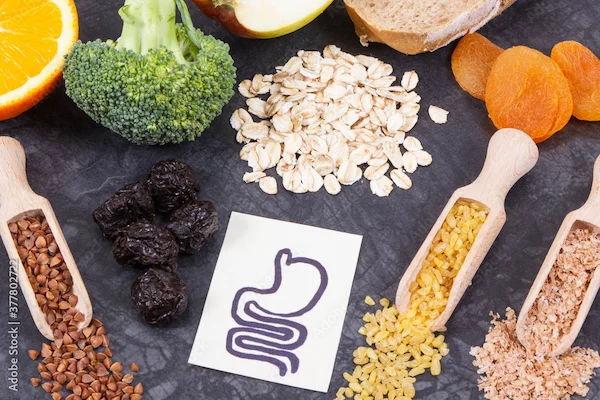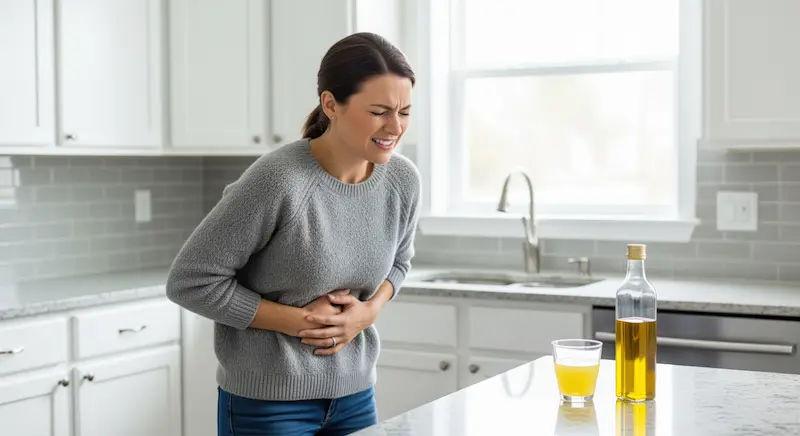How To Reduce Gas In Stomach?
How to reduce gas in stomach: Discover effective dietary adjustments, lifestyle changes, and natural remedies to alleviate bloating and discomfort caused by excess gas.

Written by Dr.Sonia Bhatt
Last updated on 13th Jan, 2026

Introduction
Gas in the stomach is a common issue that everyone experiences at some point. While it’s usually harmless, excessive gas can cause discomfort, bloating, and even pain. The good news is that there are simple and effective ways to reduce gas and improve digestion. In this article, we’ll explore the causes, symptoms, and practical tips to manage stomach gas.
What Causes Gas in the Stomach?
Gas forms naturally in the digestive system when bacteria in the gut break down food. However, excessive gas can result from:
Swallowing air: Ingesting air through habits like eating quickly or drinking carbonated drinks.
Gas-producing foods: Consuming items such as beans, cabbage, or dairy that lead to gas formation.
Digestive disorders: Conditions like IBS or celiac disease that disrupt normal digestion.
Food intolerances: Difficulty in digesting specific foods, leading to gas.
Constipation: Slowed digestion that results in gas accumulation.
Common Symptoms of Excessive Gas
Common symptoms of excessive gas are:
Bloating: A distended or swollen feeling in the abdomen.
Frequent burping: Regular expulsion of air from the stomach.
Abdominal pain: Cramping or discomfort in the stomach region.
Flatulence: Passing gas from the rectum.
Rumbling stomach: Audible gurgling or rumbling sounds from the abdomen.
Consult Top Gastroenterologist
Simple Ways to Reduce Stomach Gas
Simple ways to reduce stomach gas are as follows:
Eat Slowly and Chew Thoroughly: Eating too fast causes you to swallow air, leading to gas. Take smaller bites, chew food properly, and avoid talking while eating.
Avoid Gas Producing Foods: Some foods are known to cause more gas. Common culprits include:
Beans, lentils, and chickpeas
Broccoli, cabbage, and cauliflower
Dairy products (if lactose intolerant)
Carbonated drinks and beer
Artificial sweeteners (sorbitol, xylitol)
If you notice certain foods trigger gas, try reducing or eliminating them.
Stay Hydrated: Drinking enough water helps digestion and prevents constipation, which can worsen gas. Opt for herbal teas like peppermint or ginger tea, which can soothe digestion.
Exercise Regularly: Physical activity helps move gas through the digestive tract. A short walk after meals can aid digestion and reduce bloating.
Try Probiotics: Probiotics (found in yogurt, kefir, or supplements) promote healthy gut bacteria, improving digestion and reducing gas.
Avoid Chewing Gum and Drinking Through Straws: Both habits make you swallow extra air, increasing gas buildup.
Use Over the Counter Remedies: If lifestyle changes aren’t enough, you can try:
Simethicone (breaks up gas bubbles)
Lactase supplements (for lactose intolerance)
Digestive enzymes (help break down tough-to-digest foods)
Manage Stress: Stress and anxiety can affect digestion, leading to bloating and gas. Practices like deep breathing, yoga, or meditation can help.
When to See a Doctor?
Most gas-related issues resolve with simple changes, but consult a doctor if you experience:
Severe or persistent abdominal pain
Unexplained weight loss
Blood in stool
Frequent diarrhea or constipation
Signs of infection (fever, vomiting)
These could indicate an underlying digestive disorder that needs medical attention.
Conclusion
Gas is a normal part of digestion, but excessive gas can be uncomfortable. By making small adjustments to your diet and lifestyle, you can significantly reduce bloating and discomfort. If problems persist, don’t hesitate to seek medical advice. For personalized guidance, you can consult a gastroenterologist on Apollo 24|7 or schedule a digestive health checkup to rule out any underlying conditions. Stay healthy and gasfree!
Consult Top Gastroenterologist
Consult Top Gastroenterologist

Dr. Chethan T L
General Physician/ Internal Medicine Specialist
5 Years • MBBS, MD, DNB (General Medicine)
Bengaluru
Apollo Medical Center, Marathahalli, Bengaluru

Dr. Sumanth Simha Vankineni
Gastroenterology/gi Medicine Specialist
4 Years • MD, DM (Medical Gastroenterology )
Chinagadila
Apollo Hospitals Health City Unit, Chinagadila
(25+ Patients)
Dr Rohan P Reddy
Gastroenterology/gi Medicine Specialist
15 Years • "DM, Gastroenterology (2017) – Gandhi Medical College & Hospital Gold Medalist, Best Outgoing Student in the state MD, Internal Medicine (2014) – Chalmeda Anand Rao Institute of Medical Sciences Research in NAFLD, critical care, infectious diseases MBBS (2010) – Chalmeda Anand Rao Institute of Medical Sciences Best Outgoing Student of the batch"
Hyderabad
Apollo Hospitals Financial District, Hyderabad

Dr. Swapnil Mujawdiya
Gastroenterology/gi Medicine Specialist
7 Years • MBBS, MD (Medicine), DM, Gastroenterology, SGPGI (Lucknow).
Indore
Apollo Hospitals Vijay Nagar, Indore

Dr G Varun Teja
Gastroenterology/gi Medicine Specialist
6 Years • MBBS (Osmania Medical College) MD Internal Medicine (PGIMER, Chandigarh) DM Gastroenterology (AIIMS, New Delhi) Fellowship in Advanced Endoscopy (AIIMS, New Delhi)
Chinagadila
Apollo Hospitals Health City Unit, Chinagadila
(50+ Patients)
Consult Top Gastroenterologist

Dr. Chethan T L
General Physician/ Internal Medicine Specialist
5 Years • MBBS, MD, DNB (General Medicine)
Bengaluru
Apollo Medical Center, Marathahalli, Bengaluru

Dr. Sumanth Simha Vankineni
Gastroenterology/gi Medicine Specialist
4 Years • MD, DM (Medical Gastroenterology )
Chinagadila
Apollo Hospitals Health City Unit, Chinagadila
(25+ Patients)
Dr Rohan P Reddy
Gastroenterology/gi Medicine Specialist
15 Years • "DM, Gastroenterology (2017) – Gandhi Medical College & Hospital Gold Medalist, Best Outgoing Student in the state MD, Internal Medicine (2014) – Chalmeda Anand Rao Institute of Medical Sciences Research in NAFLD, critical care, infectious diseases MBBS (2010) – Chalmeda Anand Rao Institute of Medical Sciences Best Outgoing Student of the batch"
Hyderabad
Apollo Hospitals Financial District, Hyderabad

Dr. Swapnil Mujawdiya
Gastroenterology/gi Medicine Specialist
7 Years • MBBS, MD (Medicine), DM, Gastroenterology, SGPGI (Lucknow).
Indore
Apollo Hospitals Vijay Nagar, Indore

Dr G Varun Teja
Gastroenterology/gi Medicine Specialist
6 Years • MBBS (Osmania Medical College) MD Internal Medicine (PGIMER, Chandigarh) DM Gastroenterology (AIIMS, New Delhi) Fellowship in Advanced Endoscopy (AIIMS, New Delhi)
Chinagadila
Apollo Hospitals Health City Unit, Chinagadila
(50+ Patients)




